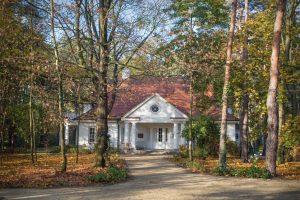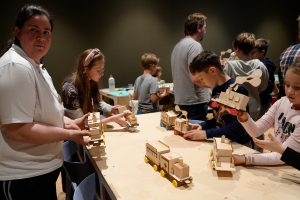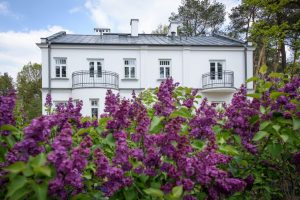Introducing the Józef Piłsudski Museum in Sulejówek
It is with great pleasure that I can introduce our institution, the Józef Piłsudski Museum in Sulejówek, to ENCOUNTER – European Network for Country House and Estate Research. Thank you for giving us space in this Newsletter!
Although we are a big historical museum, devoted to the life and achievements of Józef Piłsudski, one of the so-called Founding Fathers of Polish Independence in 1918, there is a strong “family” component in our narration, which we consider worthy to present to the Network. The museum is in Sulejówek, a small town near Warsaw. Here the Piłsudskis had their manor house, which fortunately was not destroyed during War. The museum was founded at the initiative of Sulejówek inhabitants, Piłsudskis’ daughters, and with government funding. We are a public-private partnership institution, supervised by the Minister of Culture and National Heritage and the Jozef Pilsudski Family Foundation.
The history of the Piłsudskis having the family nest in Sulejówek starts with a purchase of a small wooden house with a piece of land, from a railway worker, in 1922. It was a summer house where this outstanding woman, Aleksandra Szczerbinska, woman activist and clandestine independence fighter, tried to finally set up a home with her partner (later they married so she took the surname Piłsudska) and their two daughters.
This wooden barrack is presently under reconstruction. Next to it, a brick Manor House Milusin was erected in 1923. It underwent a thorough renovation in 2019-2021 and now it is open for visitors. Since the building itself and the interiors, furniture and upholstery, decorations and small items are all museum artifacts, we can not arrange many activities inside it. But around it, in the natural garden, and in spaces dedicated to educational activities, placed in the Main Building of the museum complex, we have developed very rich educational and social integration projects.
The Pilsudski family came from Lithuanian Polish descent, and whenever we touch upon history and the broad context of his time and society, we enter a wider discussion of Eastern and Northern Europe and the complexity of historical processes. As Jozef Pilsudski’s elder brother Bronisław Piłsudski developed himself into a pioneer in Ainu studies while exiled to Sakhalin (the Ainu people used to live in the lands surrounding the Sea of Okhotsk and at the Pacific coast) we devote some of our activities also to Bronislaw’s heritage, both in Sakhalin, Manchuria, Japan, and Poland.
We have a very well-developed Local Program, serving to integrate the community of Sulejówek inhabitants and regional institutions or organizations (e.g. Scouts, fire brigade)
For example:
We established cooperation with around 50 volunteers, living in the area of Warsaw.
together with the local authorities, we organize spring and autumn bicycle trips;
we organize walking trips in Sulejówek encouraging people to discover their neighborhood and physical activities;
We also run a number of other activities and I hope we will be able to present them to our Colleagues in the Network!
Yours
Jadwiga Rodowicz-Czechowska
Deputy Director for Development
for further contact: j.rodowicz@mjpws.pl


